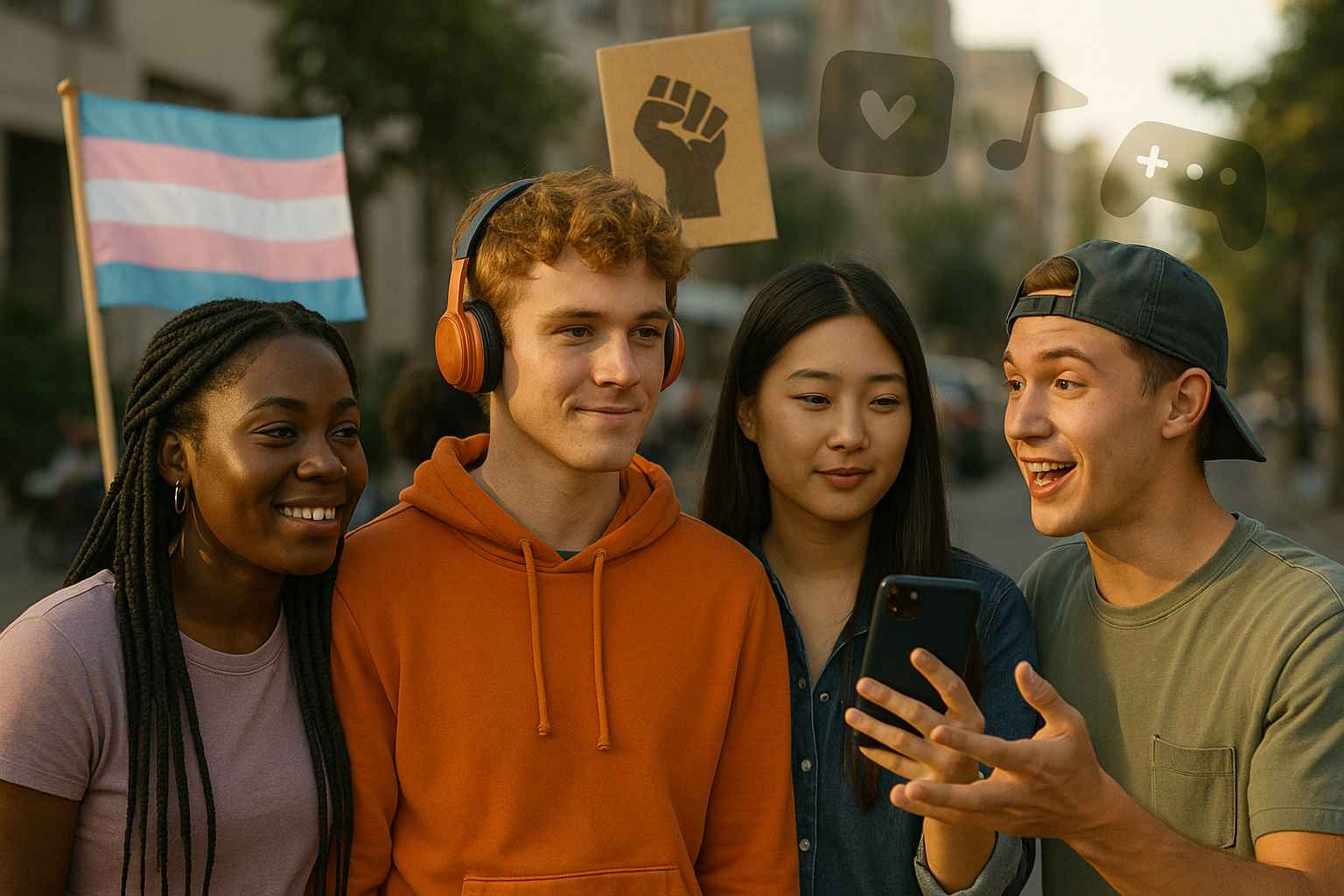Often labelled as digital natives, Gen Z—those born roughly between 1997 and 2012—have grown up in a hyper-connected world that’s constantly evolving. Their values, behaviors, and expectations are rewriting cultural norms, influencing everything from technology to politics. Unlike previous generations, Gen Z isn’t content to simply consume culture—they create, challenge, and redefine it in real time.
1. Redefining Social Media Norms

Gen Z culture isn’t just using social media—they’re reinventing it. Platforms like TikTok, Instagram Reels, and BeReal are favored over Facebook or Twitter because they emphasize creativity, authenticity, and real-time interaction. Gen Z values transparency, often rejecting heavily filtered or overly curated content.
They’re pushing influencers and brands to engage more genuinely, changing the face of digital marketing in the process. According to Pew Research, 67% of teens use TikTok, with many using it as a search engine for news and lifestyle content. (source)
2. Championing Mental Health Awareness

For Gen Z, mental health is not taboo—it’s a priority. They openly discuss anxiety, depression, therapy, and self-care on public platforms, contributing to a broader cultural shift that normalizes seeking help. Apps like Headspace and Calm are popular tools, and there’s a rise in teletherapy use.
Their openness has prompted schools, workplaces, and even governments to address mental health more seriously. A report from McKinsey calls Gen Z “the most stressed generation,” yet also the most proactive about wellness.
3. Influencing Fashion with Sustainability

Fast fashion is losing favor as Gen Z leads a resurgence of thrift shopping, upcycling, and sustainable brands. They are making eco-conscious fashion mainstream by supporting brands that emphasize ethics and transparency. Apps like Depop and Vinted have exploded in popularity. Gen Z’s preferences are pressuring large fashion houses to adapt or risk irrelevance. According to ThredUp’s annual report, 62% of Gen Z prefer buying from sustainable brands. (source)
4. Elevating Activism into the Mainstream

This generation uses digital platforms to rally for causes ranging from climate change to racial justice, reflecting the broader values of Gen Z culture. Movements like Fridays for Future and #BlackLivesMatter have gained enormous traction with Gen Z at the forefront.
Their activism is less about symbolism and more about tangible action—petitions, fundraisers, and community organization. A study by DoSomething Strategic found that 75% of Gen Z actively research a company’s stance on social issues before making purchases. (source)
5. Revolutionizing Entertainment Consumption

Gen Z culture is defined by an entertainment diet that blends gaming, YouTube, streaming platforms, and short-form video. Traditional TV and cinema are losing relevance. They prioritize on-demand, interactive, and binge-worthy content. Twitch, Discord, and Netflix originals like Stranger Things dominate their screens. According to Deloitte, 60% of Gen Z prefer streaming over live TV and spend more time watching user-generated content.
6. Transforming Language and Communication

Memes, emojis, abbreviations, and GIFs aren’t just fun—they’re a new language. Gen Z communicates with high visual literacy and digital fluency. Phrases like “slay,” “bet,” and “ratioed” reflect their unique syntax. Apps like Snapchat and Discord reflect their communication style: quick, visual, and nonlinear. Their language trends quickly become mainstream, influencing pop culture and even advertising lexicons.
7. Demanding Brand Authenticity

Gen Z culture means they can sniff out performative branding a mile away. They value companies that walk the talk on social issues, diversity, and sustainability. Brands like Patagonia, Glossier, and Ben & Jerry’s have won their loyalty through transparency and action.
According to Edelman’s Trust Barometer, 70% of Gen Z expect brands to take a stand on issues that matter. They also prefer brands that hire diverse teams, publicly disclose supply chains, and respond directly to consumer feedback on social media platforms.
8. Normalizing Non-Traditional Career Paths

The 9-to-5 is optional for many Gen Zers. They embrace freelancing, gig work, creator economy jobs, and entrepreneurship. Influencers, streamers, and digital nomads are legitimate career aspirations. Gen Z values purpose, flexibility, and autonomy in work. A survey by EY found that 39% of Gen Z would leave a job if it didn’t align with their values. Many pursue side hustles while studying or working, with platforms like Fiverr, Gumroad, and Substack enabling creative independence and diversified income streams.
9. Driving Technological Adoption

Gen Z expects seamless tech integration—from AI to augmented reality. They adopt emerging platforms early and influence mass adoption. Whether it’s ChatGPT, VR headsets, or decentralized platforms like Mastodon, Gen Z shapes digital innovation through usage patterns and viral trends. According to IBM, 75% of Gen Z use smartphones more than five hours a day, showing a high engagement with evolving tech landscapes. They’re also quick to experiment with blockchain tools, gaming hardware, and automation software to stay ahead in both play and productivity. (source)
10. Reshaping Education Models

Online learning, digital classrooms, and alternative credentials (like certificates from Google or Coursera) are preferred over rigid university systems. Gen Z embraces lifelong learning and prioritizes practical skills over degrees. The pandemic accelerated this shift, and now hybrid and remote learning are baseline expectations.
A report from Pearson reveals 44% of Gen Z believe traditional education doesn’t prepare them for the future. Many now value peer-to-peer learning, coding bootcamps, and micro-credentialing more than outdated institutional frameworks or legacy university rankings.
11. Diversifying Beauty Standards

Gen Z is dismantling one-size-fits-all beauty norms. They celebrate diversity, body positivity, and gender-fluid expression. Brands like Fenty Beauty and e.l.f. have gained popularity by offering inclusive product lines. Gen Zers embrace individuality over conformity, challenging decades of industry-defined beauty.
According to Statista, 70% of Gen Z say beauty brands should represent more diverse people in their ads. They also support clean beauty, demand ingredient transparency, and reject unrealistic portrayals in ads or social feeds.
12. Challenging Gender and Identity Norms

Gen Z culture leads in normalizing pronoun use, gender-neutral fashion, and open dialogue about sexuality and identity. Surveys show that more Gen Zers identify outside the traditional gender binary than any previous generation. They are redefining gender as fluid, pushing brands and institutions to adapt. A Gallup poll found 20% of Gen Z adults identify as LGBTQ+—a significant shift from older generations. Their push for inclusive bathrooms, queer representation, and legal protections is reshaping laws and public discourse. (source)
13. Redefining Consumer Behavior

Subscription models, buy-now-pay-later options, and ethical consumption are central to Gen Z shopping habits. They research products, compare reviews, and avoid impulse buys. Platforms like Klarna and Honey are tailored to this research-heavy, budget-conscious demographic.
A report by Bloomberg states that Gen Z influences $360 billion in purchasing power annually in the U.S. alone. They also prioritize secondhand shopping, minimalist lifestyles, and supporting local businesses over global mega-corporations whenever possible.
14. Fostering Global Cultural Exchange

Raised in a borderless digital world, Gen Z culture thrives on consuming international media like K-pop, anime, and foreign films with ease. They are less restricted by national culture and more influenced by global trends. BTS, Squid Game, and Studio Ghibli are household names globally thanks to Gen Z fandoms.
Their consumption fosters cross-cultural appreciation and breaks down geographic barriers. They also use language-learning apps, participate in global online communities, and collaborate with international creators on platforms like TikTok and YouTube. (source)
15. Redefining Success

For Gen Z, success isn’t just about money or status—it’s about fulfillment, freedom, and making a difference. They reject hustle culture and gravitate toward balance, purpose, and well-being. Success is more individualized and fluid, reflecting diverse life paths. As a result, they’re influencing workplaces, education, and even politics to reconsider what a “successful” life looks like. Many prioritize mental health, community involvement, and passion projects over hierarchical promotions or material benchmarks.

